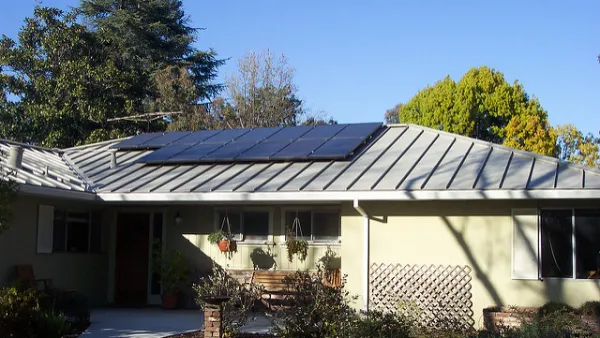The California governor began an unprecedented fourth term by laying out goals to reduce carbon emissions and oil consumption, address road and bridge maintenance, build high speed rail, and construct two huge water tunnels under the Sacramento Delta
"The 76-year-old Democrat, who held office from 1975 to 1983 before term limits and returned for a third term in 2011, delivered a joint inauguration and state of the state address in the Assembly chamber at the state Capitol" on Jan. 5, writes Melody Gutierrez of the San Francisco Chronicle.
Gutierrez lists his three energy-environmental goals to be attained by 2030:
• Increase from 33 percent to 50 percent the amount of electricity derived from renewable sources, (known as the Renewable Portfolio Standard, or RPS).
• Reduce oil consumption by 50 percent — largely by increasing use of electric vehicles.
• Raise building energy efficiency, partially by increasing use of rooftop solar panels.
Gutierrez describes Brown's three infrastructure goals he feels are critical to the states' future:
- Tackling the enormous $59 billion problem of deferred highway and bridge maintenance.
- Constructing two enormous tunnels to carry water south around the Sacramento-San Joaquin River Delta
- Building the nation's first (or second, depending on progress by the Texas Central Railway) high speed rail system.
The following day, Brown appeared at the high speed rail groundbreaking in Fresno.
According to David R. Baker, the Chronicle's business reporter who covers clean tech and energy, increasing the RPS to 50 percent by 2030 (from 33 percent by 2020) will be a huge boon for solar power industry.
Their business within California has been driven by government mandates. (The current) requirement triggered a wave of solar plant construction in the Southern California desert, which peaked in the last two years.
However, those large solar projects may be viewed as controversial, depending upon their location, by the environmental community.
As for oil reduction, that goal may prove more elusive, particularly with the lowest oil prices in five years, notwithstanding the new wholesale carbon charge expected to add 10-cents per gallon. We noted last month that "(f)or the first time since 2006, gasoline consumption in California increased from the prior fiscal year, though Baker points out that consumption "remain(s) about 8 percent below the (2005) peak, according to the California Board of Equalization, which tracks fuel sales through tax receipts."
FULL STORY: Gov. Jerry Brown lays out vision at historic 4th inauguration

National Parks Layoffs Will Cause Communities to Lose Billions
Thousands of essential park workers were laid off this week, just before the busy spring break season.

Retro-silient?: America’s First “Eco-burb,” The Woodlands Turns 50
A master-planned community north of Houston offers lessons on green infrastructure and resilient design, but falls short of its founder’s lofty affordability and walkability goals.

Delivering for America Plan Will Downgrade Mail Service in at Least 49.5 Percent of Zip Codes
Republican and Democrat lawmakers criticize the plan for its disproportionate negative impact on rural communities.

Test News Post 1
This is a summary

Test News Headline 46
Test for the image on the front page.

Balancing Bombs and Butterflies: How the National Guard Protects a Rare Species
The National Guard at Fort Indiantown Gap uses GIS technology and land management strategies to balance military training with conservation efforts, ensuring the survival of the rare eastern regal fritillary butterfly.
Urban Design for Planners 1: Software Tools
This six-course series explores essential urban design concepts using open source software and equips planners with the tools they need to participate fully in the urban design process.
Planning for Universal Design
Learn the tools for implementing Universal Design in planning regulations.
EMC Planning Group, Inc.
Planetizen
Planetizen
Mpact (formerly Rail~Volution)
Great Falls Development Authority, Inc.
HUDs Office of Policy Development and Research
NYU Wagner Graduate School of Public Service



























